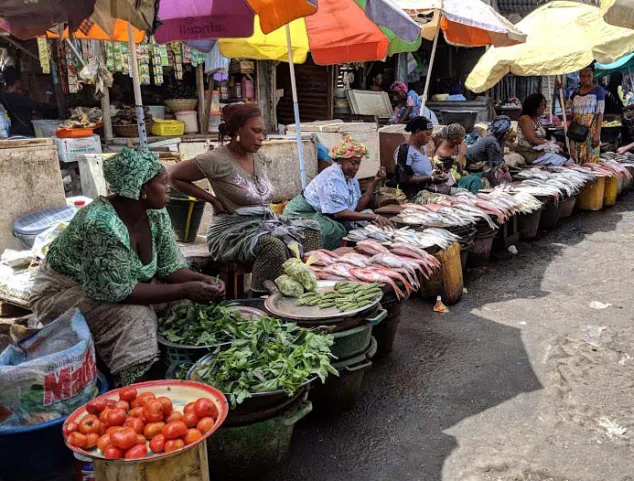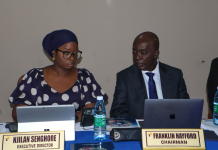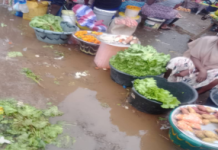By Amadou Manjang
Street vendors across the Greater Banjul Area continue to provide essential services and employment to Gambians despite frequent crackdowns by municipal authorities. From Serekunda Market to street corners and busy intersections, these vendors sell everything from vegetables and water to clothes and cosmetics—often under difficult conditions.
At Serekunda Market, vendors occupy sidewalks and roadside spaces, forcing pedestrians onto the road. Many sell goods in buckets or on makeshift tables, while others walk through traffic carrying items on their heads. The vendors are part of a growing informal economy that employs the majority of Gambians.
“This is our only source of livelihood,” said Yama Darboe, a street vendor. Her daughter, Fatou Touray, 19, sells cold water to passengers in traffic to support the family. “Sometimes we make up to a thousand dalasis on a good day, but other days we go home with just 300 or 500 dalasis,” she said.
Not far from the market, Mariama, 35, sits with a bowl of roasted groundnuts. She said selling on the streets is her only means of survival. Nearby, Buba Ngum yells to attract customers to his second-hand clothes. “It’s tiring, but it pays,” he said.
Like them, many vendors said they have no other job options. Fatou Manneh, 45, has been hawking for 15 years. “It’s not easy, but I’ve managed to feed my family through this work,” she said. Vendors Awa Sonko, Mariama Dampha, and Cherno Jallow echoed the same message: street vending is their only source of income.
They also shared their frustrations about being removed from the streets during operations by local councils. “They push us out, but we come back,” said one vendor. “We’re just trying to survive.”
The informal sector is a major part of The Gambia’s economy. According to the Gambia Bureau of Statistics (GBOS) 2022–2023 Labour Force Survey, 62.8 percent of the national workforce is informally employed—almost double the 32.7 percent in the formal sector. A 2021 UN report estimated the informal economy made up 58 percent of the country’s GDP. More recent estimates from 2024 put the figure at 44.3 percent, worth around $4 billion in purchasing power.
Economist Dr. Foday Joof said the informal sector plays a critical role in job creation and poverty reduction. “It absorbs workers who can’t find formal jobs and helps stabilize food prices by distributing goods from rural to urban areas,” he said.
Vegetable sellers like Bintou Touray buy produce from farmers and sell to urban consumers. “I sell carrots, cucumbers, tomatoes, and more,” she said. “It’s hard work, but it feeds my family.” Rising costs of goods, poor infrastructure, and a lack of proper stalls continue to affect their businesses.
Ida Nyang, a small-scale vendor who sells onions and vegetables, said she started her business after leaving school early. “If I had more education, I could run a bigger business,” she said.
Dr. Joof said many vendors avoid formal registration due to complex procedures and taxes. He added that poor roads, limited access to credit, and lack of training all reduce their chances of growth. “Women, who make up a large part of the informal economy, also face extra challenges like limited property rights and financial access,” he said.
To help vendors, Dr. Joof recommends simpler registration systems, better market infrastructure, and access to microfinance. He also called for training in business skills and the extension of social security programs to informal workers.
Efforts to speak with the Kanifing Municipal Council were unsuccessful. The market manager failed to attend a scheduled interview. Foroyaa will continue to follow up with the council.
Despite repeated evictions and daily struggles, street vendors continue to play a vital role in Gambia’s urban economy, supporting families and keeping markets running.



















